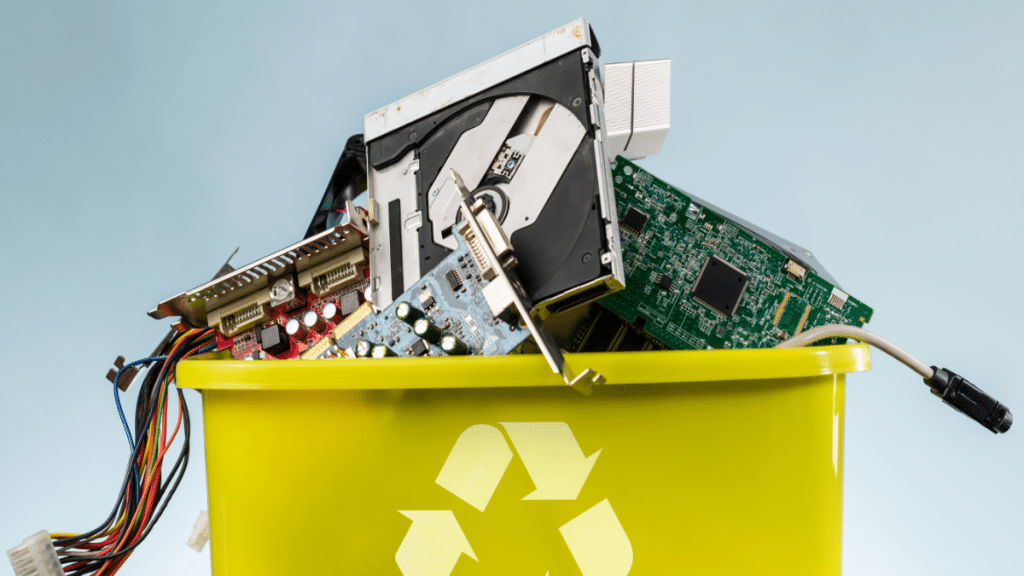Electronic waste — also known as e-waste — is one of the fastest-growing waste streams in the world. From outdated smartphones and broken laptops to old televisions and unused printers, electronic devices often end up in landfills, leaking harmful substances into the environment. The solution? Recycling electronics responsibly through certified collection companies. This ensures your devices are disposed of properly, safely, and in a way that benefits both the planet and your local community.
If you’re looking for guidance on electronics recycling in Thunder Bay, or just want to better understand how certified e-waste recycling works, this guide will walk you through the why, how, and where.
Why Electronics Recycling Is Important
Electronic devices contain a mix of valuable materials, like copper, aluminum, and even gold, alongside hazardous elements such as lead, mercury, and cadmium. When these items are tossed in the trash, not only are reusable materials wasted, but toxic substances can contaminate soil, water, and air.
Recycling electronics helps:
- Recover useful metals and components for reuse
- Prevent pollution and environmental harm
- Reduce the demand for mining new materials
- Promote a circular economy in which resources are reworked rather than thrown away
The more responsibly we handle our tech waste, the fewer resources we waste, and the better we protect the world around us.
What Are Certified Collection Companies?
Certified collection companies are organizations that have met strict environmental and safety standards for handling and processing e-waste. These businesses follow regulations that ensure electronics are dismantled, recycled, and disposed of without harming workers or the environment.
In Canada, look for companies that are certified under standards such as:
- EPRA (Electronics Product Recycling Association)
- R2 (Responsible Recycling) Certification
- ISO 14001 for environmental management
Choosing certified companies means you’re contributing to a safe, traceable, and transparent recycling process. If you’re considering electronics recycling in Thunder Bay, certified drop-off locations or pickup services should be your first choice.
Common Electronics That Can Be Recycled
Many people assume that only computers or large appliances qualify for e-waste recycling. In reality, a wide variety of household and business electronics can and should be recycled, including:
- Mobile phones and tablets
- Desktop and laptop computers
- Televisions and monitors
- Printers, fax machines, and scanners
- Keyboards, mice, and cables
- Game consoles and digital cameras
- Routers and modems
- Power tools with batteries
If a device has a plug or battery, chances are it can be recycled. Some certified centers even accept small kitchen appliances and audio equipment.
How to Prepare Electronics for Recycling
Before dropping off or scheduling pickup with a certified recycler, take a few steps to prepare your devices:
1. Wipe Your Data
For computers, phones, and tablets, perform a factory reset or use data-erasing software to protect your personal information.
2. Remove Batteries if Required
Some programs ask that you remove rechargeable batteries for separate handling. Check with your local recycling center.
3. Bundle Small Items
Group smaller electronics (like USB drives or cords) into bags or boxes so they don’t get lost in transport.
4. Check for Accessories
If you’re recycling a printer, include cords, ink cartridges, or manuals if possible. They can be reused or recycled.
Doing these small tasks helps improve the efficiency of the recycling process and protects your data.
Where to Recycle Electronics in Thunder Bay
If you’re searching for electronics recycling in Thunder Bay, you’re in luck — the city has certified programs and drop-off locations available year-round. Organizations like the Electronics Products Recycling Association (EPRA) partner with local depots to collect e-waste safely.
You can:
- Visit a certified recycling depot with accepted electronics
- Check Thunder Bay’s waste services website for e-waste event days
- Use drop-off points at participating retailers or electronics stores
- Look for business-focused pickup services for bulk disposal
When in doubt, contact your local municipality or recycling center directly to ask about their certified partners.
The Dangers of Uncertified Disposal
Using uncertified recyclers or dumping electronics in general waste bins can lead to serious problems:
- Environmental hazards from improper handling of heavy metals
- Illegal export of toxic materials to developing countries
- Identity theft from mishandled personal data
- Fines or penalties if you’re a business violating disposal regulations
Certified recyclers ensure accountability and sustainability, and in some cases, they even provide documentation or certificates of destruction, which can be helpful for businesses or government entities.
How Businesses Can Benefit from E-Waste Recycling
If you run a small or medium business in Thunder Bay, participating in certified electronics recycling isn’t just responsible — it’s strategic. Companies can:
- Free up office space by clearing out old equipment
- Ensure legal compliance with waste and privacy laws
- Enhance their corporate social responsibility (CSR) image
- Contribute to a greener brand identity
Some certified collection companies also offer asset recovery, which allows you to resell or donate functioning electronics. Your bottom line and the community gain from this as well.
Final Thoughts: Make Recycling Part of Your Routine
Electronics recycling doesn’t have to be complicated. By partnering with a certified company, whether in Thunder Bay or your local area, you’re ensuring that your old devices are handled properly — and possibly given a second life.
